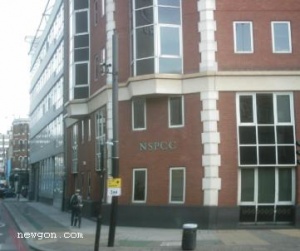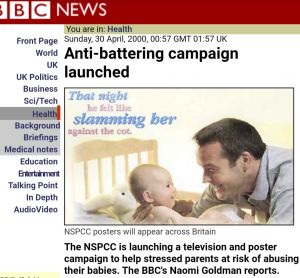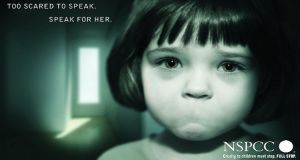One of our staff members is contributing considerably to a News Archiving service at Mu. Any well educated (Masters, PhD or above) users who wish to make comments on news sites, please contact Jim Burton directly rather than using this list, and we can work on maximising view count.
NSPCC

The National Society for the Prevention of Cruelty to Children (NSPCC, f. 1884) is a UK-based children's charity with statutory powers, and a history of circulating questionable fundraising literature. Between the 00s and the 10s, its size has been estimated at roughly 2,500 employees, with revenues of £118 Million. During this period, they were also a recipient of EU funding.
The charity are known for their emotive TV commercials, and have sometimes portrayed a demonic/oversexed image of males with children in their custody - or sought to play on common fears - putting them at odds with Mens Rights Activists among others.
Corporate/state-model
The NSPCC's success led to it effectively becoming an arm of the British state, receiving funding to carry out training programmes and other services. The NSPCC is the only UK charity which has been granted[1] statutory powers (under the Children Act 1989), allowing it to apply for care and supervision orders for "children at risk". It is also the only charity with the statutory power to undertake child abuse investigations and can be called upon by the police and local authorities to assist them. State-employed care-givers and web-administrators have been known to frequently refer cases of child abuse to the NSPCC or encourage the use of this organisation as a contact point. Philip Jenkins, 'Intimate Enemies' (Aldine de Gruyter, New York, 1992)[2], pp. 104-113, explains how this close relationship was vital to the success of the charity and its ideas:
The NSPCC acted as the conduit by which American perceptions of a problem (and soon a crisis) were introduced to Britain. NSPCC director Arthur Morton first visited the United States in 1964 and spent time with Dr C Henry Kempe, who would long be a major influence on British child protection policy.... Researchers and other officials began making frequent visits to the United States to study changing perceptions of child maltreatment. The various researchers published extensively on the topic, and there was interchange of ideas and personnel between the NSPCC and the child welfare section of the Department of Health and Social Security (DHSS), the department of central government with overall charge of the welfare system. Joan Court of the NSPCC Research Unit actually moved to head the relevant section of the SHSS. From 1970, DHSS circulars began to adopt NSPCC ideas...
[The NSPCC] was vital to the establishment of new ideas about sexual abuse...
Alan Gilmour had become director in 1979 in the middle of a crisis: “Its Inspectors...were diminishing in number and in some areas losing credibility because they were too few and too scattered to provide a coherent service; and this service was too vaguely defined” (Gilmour 1988:133-134). Gilmour's directorship produced a near revolution, focused especially on the society's centenary in 1984. This offered abundant opportunities for fund-raising and publicity... Gilmour launched an aggressive and more proactive effort at child protection, in intimate alliance with public agencies.... By 1989, the society was drawing about 11 percent of its £36 million ($45 million) budget from central and local government, the balance being raised from fund-raising and investments. The society's budget had increased over the decade by 1000%.

Dishonesty
Various examples of the NSPCC's dishonesty and disregard for young people include sensationalized advertising,[3] the contrivance of questionable social networking identities for what they claim to be abused children (see gallery),[4] and the use of falsified examples of child abuse to solicit donations in their mass mailings.[5] Children have been encouraged to expand the range of behaviors they deem to be abusive,[6] strongly supporting the hypothesis of the NSPCC as a secondary victimizer (see section on victimologists).
It has been pointed out that the NSPCC's 2009 findings that a quarter of 18 to 24 year olds had experienced "severe physical violence, sexual abuse or neglect in childhood" and that one in five had been "physically attacked by an adult, raped or sexually assaulted or severely neglected during their lives" are tainted by their inclusivity. Those categories included "serious emotional neglect or lack of physical care or supervision", which were defined as including "parents never or hardly ever asking their child who they were going out with or where or what they were doing".[7]
NSPCC campaigns have been criticised[8] for their ineffectuality by organisations such as NPC:
The answer, suggests the report by New Philanthropy Capital (NPC), is not a lot. Campaigning to change public attitudes and keep abuse on the radar, as NSPCC does with some success, has its place, but there is zero evidence that this leads to fewer beatings. The logic behind Full Stop, it argues, is flawed and naive: "Improved attitudes to abuse can certainly facilitate the identification and reporting of abuse that is already occurring, but they seem to have very little bearing on whether a substance-abusing parent neglects their child behind closed doors, or whether a sexual offender chooses to abuse a child when they have the opportunity to do so in secret."
The charity has also faced criticism for its obsession with publicity and advertising, for fearmongering[9][10] and fabricating or exaggerating facts and figures in its research. In an article in Spiked Magazine, Frank Furedi professor of sociology at the University of Kent, branded it a [11] "lobby group devoted to publicising its peculiar brand of anti-parent propaganda and promoting itself." NSPCC wages are most certainly excessive for a charity - matching those of civil servants in most cases. For example, in 2008 (Guardian), a Campaigns Development Adviser could expect to earn up to £40k pa and graduates entered at £16-18k pa (Hobsons, 2008).
Sex, and other scandals
There have been examples of sex-scandals involving NSPCC staff. These include an amateur fetishistic pornographer, and the authorization of prolific sex-abuse fantasist, fraudster and child sex offender Carl Beech to give talks at primary schools.[12][13] Data misuse has also been indicated and led to a fine from the Information Commissioner in 2017.[14]
SRA: A betrayal of the NSPCC's agenda
During the late 1980s and early 1990s, a moral panic emerged over alleged ritual satanic abuse. The NSPCC provided a publication known as 'Satanic Indicators' to social services around the country that has been blamed for some social workers panicking and making false accusations. The most prominent of these cases was in Rochdale in 1990 when up to 20 children were taken from their homes and parents after social services believed them to be involved in satanic or occult ritual abuse. The allegations were later found out to be false.[15] The case was the subject of a BBC documentary which featured recordings of the interviews made by NSPCC social workers, revealing that flawed techniques and leading questions were used to gain evidence of abuse from the children. The documentary revealed[16][17] that social services were wrongly convinced by organisations such as the NSPCC, that abuse was occurring and was so rife that they made allegations before any evidence was considered.

Thought crime
Further assimilation of NSPCC incentives on Child Pornography into UK law would lead to an expansion of the current thought crime agenda. For example, a NSPCC Policy Advisor, Zoe Hilton supported the closure of role-play websites in which it is possible for adults to play out adult-child sex fantasies (age-regression) without involving any actual minors:
It is not OK to fantasise about this stuff. These kind of interactions need to be shut down.[18]
Prostasia Foundation are one example of a "sex positive" child protectionist charity who have pled for donors to reconsider leaving large amounts of money in their will to the NSPCC, because of such positions.
Gallery
-
Example of claimed "real life stories" with implausible youthspeak
See also
- Child safety mascot - The NSPCC sometimes uses mascots, such as the Pantosaurus, a dinosaur that advises children not to let strangers touch their genitals.
External links
- Wikipedia
- The NSPCC needs to be stopped, full stop - Dea Birkett, Guardian article.
- Guardians that need a good smack - Times criticism.
Reddit articles
Angry Harry's articles
Archived opinion pieces from a Men's Rights Activist who bitterly opposed the children's charity.
- NSPCC Shatters Child Abuse Myths - 2000.
- NSPCC: Do We Need An Abuse Industry? - 2004.
- NSPCC: Demonising Men - 2004.
- NSPCC Exposed Yet Again - 2006.
- NSPCC: Do We Need An Abuse Industry? - 2007.
- Charity or Self-Interest? - 2008.
- Child Abuse: The Real Culprits - 2014.
References
- ↑ Children Act 1989
- ↑ Intimate Enemies: Moral Panics in Contemporary Great Britain
- ↑ The Guardian - NSPCC
- ↑ Questionable social media Profiles
- ↑ Daily Mail: Fake Abuse
- ↑ BBC - Schools 'not advising on abuse'
- ↑ Million children 'severely maltreated', says NSPCC
- ↑ Guardian: Criticism
- ↑ Guardian: Criticism of fearmongering
- ↑ SIRC - Advertising criticism
- ↑ Frank Furedi
- ↑ Rubber Fetish
- ↑ Carl Beech/NSPCC
- ↑ ICO Fine
- ↑ MEN Media: Satanic abuse: The truth at last
- ↑ documentary BBC - When Satan came to town
- ↑ Spiked - A full stop to the Satanic panic
- ↑ Zoe Hilton - Age regression bigotry
